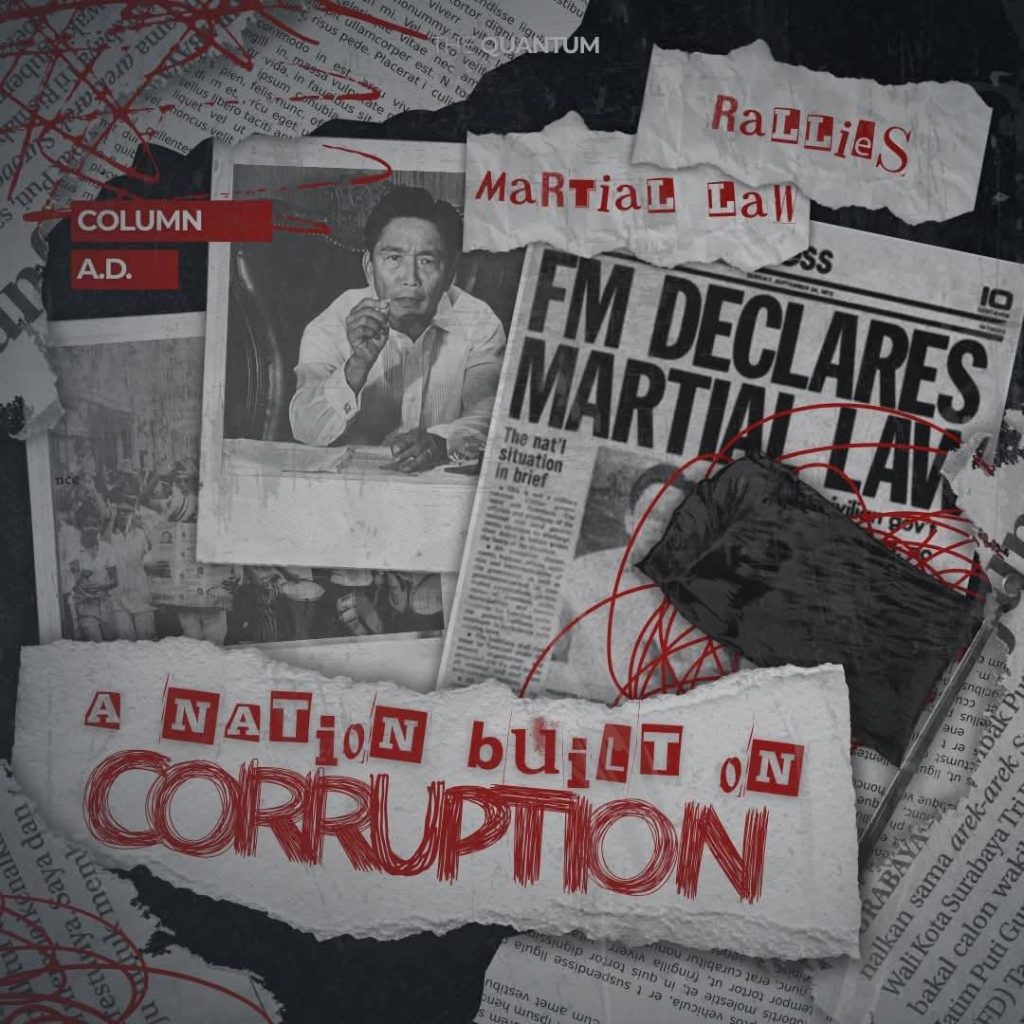by: A.D.
Copyedited by: S.C.
Publication by: P.B.

Last Sunday, streets were flooded not by mementos of ghost projects, but by the imprints of hundreds of thousands of Filipinos who dared defy the corrupt. Placards may be put down, streamers may be folded away, and chants may slowly fade. But this time, the people will not relent.
It is no coincidence that the nationwide protests occurred on the anniversary of Ferdinand Marcos Sr.’s proclamation of Martial Law 53 years ago—an era marked by censorship, abuse, historical revisionism, and the systemic dismantling of democracy. In fact, it was the perfect juncture to call out the brazen robbery of trillions and demand long-overdue accountability from the perpetrators. September 21 wasn’t just a famous remembrance, but a haunting reminder that the remnants of the past continue to scar the Filipinos.
Corruption has always been a systemic issue. Not a recent trend, nor a political anomaly. It has been deeply entrenched in the field of governance, guarded by impunity, and has continued for decades that it might as well be an heirloom.
Generations of corruption do more than just put wealth in a politician’s pocket. It erodes trust, impedes progress, and manipulates the masses to tolerate social injustices. No justification must save the regime from scrutiny.
From lists of phantom projects, shady contractors, and nepo babies, to senate hearings of corrupt officials and echoes of a corrupt past—it’s as if the shameless betrayal of the public became the tipping point for the nationwide protest. When a nation has endured decades of outright theft, anger, distrust, and indignation inevitably take root—and are passed down to future generations. Youth inherit broken systems and are left to fix damages they didn’t cause.
Because when the youth have their present stolen, they rise to fight for their future. And the streets heard them. Banners were raised, chants were echoed through every avenue, and rallies were led by compassionate youths, sectoral groups, and societal organizations. And fittingly, it all unfolded on the Martial Law anniversary.
But this year, September 21 was no longer about lamenting the past; it’s about confronting the injustices of the present. The recent protest recounted that stolen past and cried out, “Never forget.” It stood against a myriad of grievances—ignorance towards agriculture, a flawed education system, and corruption, among many others—and they roared, “Never again.”
Was this march finally a break in the pattern, or are we doomed to repeat the cycle of outrage and forgetting? Frankly, the answer relies on our volition to remain steadfast in demanding accountability and transparency. We deserve leaders who serve the people, not their own interests. We deserve better.
When the noise finally fades, there is no one to sound the alarms but ourselves. What matters most isn’t the protest, it’s what happens after. To confront the issues without animosity is worthless. Outrage without persistence dies as noise.
A nation built on corruption does not weaken—it only hardens its resolve. Their defiance and determination to punish the culprits must only grow stronger. And we, then, must carry this fire until every corner of our society is free from the grips of corruption.
The recent march was a testament—a testament to the people’s anger, their resentment, and their desire for change. It was a powerful warning, impossible to ignore, meant for everyone to see.
Our message is clear: Condemn them. Incarcerate them.
And if that sounds threatening, it is—because the future of this nation depends on it.



